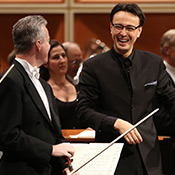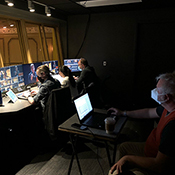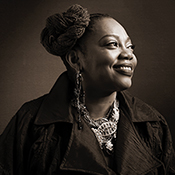
MSO Celebrates 100 Years of Astor Piazzolla
David Lewellen
PUBLISHED
Tagged Under: 2020.21 Season, Guest Artist, Pops
Even after stepping down as the Milwaukee Symphony’s concertmaster, even during a pandemic, Frank Almond feels like he is busier than ever.
Almond, who was the MSO’s concertmaster for 25 years, announced plans to leave the orchestra at the end of the 2019.20 season, although the pandemic cut off his ceremonial farewell. But this weekend, he will appear on the Bradley Symphony Center stage as part of a unique quartet celebrating the music of Astor Piazzolla.
Piazzolla, the Argentinian composer born 100 years ago this month, was the master of the tango, taking the music out of dive bars and into the concert hall, but he was also prolific in other genres. The program on Saturday puts him in context, including works by composers who influenced him and composers who came after him.
As well as Almond, the program features Stas Venglevski, a performer and arranger for the bayan. The instrument is a chromatic button accordion developed in Russia in the late nineteenth century. It differs from most accordions developed in Western Europe primarily in the detail of its construction, and it bears a family resemblance to Piazzolla’s own instrument, the bandoneon. “We’re excited to play in the new hall,” Venglevski said. “It’s very exciting after the COVID situation.”
The MSO event this weekend is technically a pops concert, but Almond compared Piazzolla to the unclassifiable German émigré composer Kurt Weill. “It’s tempting to dismiss it as dance music, but he was a serious musician,” he said. “He was a gifted composer, and he had a formal music education. He took tango from the bars and slums and onto the concert stage.”
The combination of violin, cello, piano and bayan “looks funny on paper, but it’s a great combination of instruments,” said Almond, who has done many concerts with Venglevski over the years. “But you need someone like Stas to maximize the potential of the bayan.” Venglevski’s arrangements make for a good concert “because he’s the person playing that instrument,” Almond said. “He’s a master of knowing how to set up tunes for those instruments.”
Venglevski, who grew up in the former Soviet republic of Moldova and studied at Soviet conservatories, said that there, the bayan “is a classical instrument like violin or piano. It’s a little complicated to learn, but once you learn it, it’s a pleasure to play.” He moved to Milwaukee in 1992 so that his wife, cellist Roza Borisova, could study at UW-Milwaukee with the Fine Arts Quartet. (She will be part of the tango quartet on Friday, along with pianist Jeannie Yu.)
Almond had set up a lot of activities to pursue in 2020 once he had departed the MSO. “I’m not the retiring type,” he said, “but I could feel that I was done, and it was time to do other stuff I wanted to do.”
That included more teaching and a bigger role with the Milwaukee Youth Symphony Orchestra, which he said was “the only arts group in town to do everything in person” for the 2020-21 season. “It’s kind of amazing what they’ve been able to pull off.” He has done master classes, lessons, and conducting for MYSO, but “mixed in, I’ve had days where I don’t want to get up and felt that it’s so weird not to play with people. It’s very difficult and disorienting.”
But having plans for himself, even if the pandemic forced adjustments, helped him cope after all performing arts groups shut down last spring. Talking to former colleagues, Almond finds that “some people are doing really well, and some people – there’s a spectrum of emotions. This forces you to be really comfortable with not knowing what’s going on. No one knows.”
As for his own long-running chamber series, Frankly Music: “We had to figure out, do you do stuff online, do you do some kind of hybrid?” A small organization can more easily make quick decisions, and most of the Frankly Music concerts have been via the online format.
Venglevski, who has been associated with the MSO for years through educational concerts and other events, also saw every engagement cancelled on his busy calendar last year, “and then the virtual thing came along. Musicians are adapting. When everything goes back to normal, live stream will still exist, and we can reach new audiences.”



